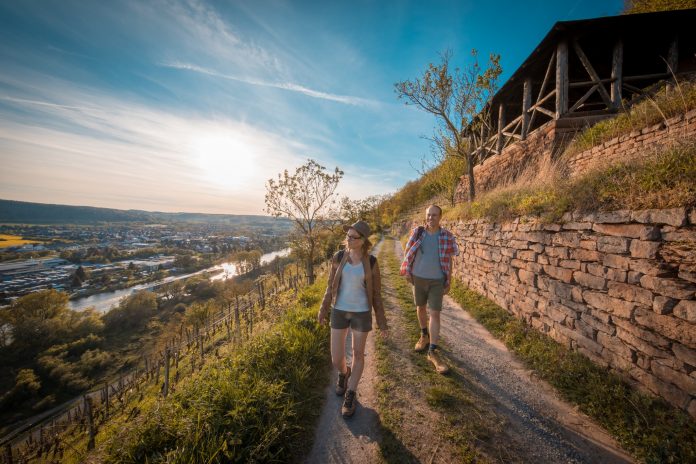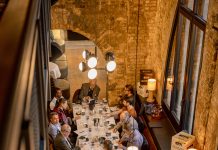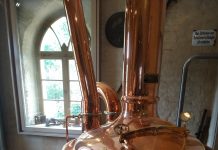Erlenbach am Main, Germany (Gastrosofie). Reinhold Hillerich is not waiting for us as one might expect in front of his Erlenbach winery but up at the Festplatz, just outside the impressive local swimming pool bordering onto a hill adored with grapes, to take us along for a red wine hiking trip over to Klingenberg.
The stage from Erlenbach to Klingenberg is the fourth of six stages leading from the winegrowing town of Großwallstadt in the north to Bürgstadt, which is regarded as the place to taste brilliant Pinot Noir, in the south.
Our guide is Reinhold Hillerich, who not only accompanies us from the „Gate to the Wine Terraces“ into the red sandstone wine slopes. The path from Erlenbach to Klingenberg is „extremely popular with all hikers“ because it’s „easy to walk on“ and offers „wonderful views of the Main Valley“. A quick glance at a where-to-go board with current information on wine events and seasonal bistros in the countryside called “Häckerwirtschaften”, and we’re off hiking.
First we walk up a steep slope, then more or less gently along the vineyards. The sun is shining and we understand: „Steep slopes, red sandstone and sun – then the winegrowers won“, as Hillerich gives us to understand. While walking, Hillerich takes us on a tour of wine wisdom, pouring out his knowledge of Ferdinand Oechsle and demonstrating how to use a strange gadget, a “refractometer”. All are now allowed to determine the alcohol content of grapes picked in volume percentage or the sugar content of grape juice, which in September is already a much more enjoyable task than in August.
Here and there we encounter figures made of Erlenbacher ship steel, which are man-high and show winemakers at work in the vineyards, illustrating more or less the topic „winegrowers gold“.
Hillerich explains that „the making of wine in these steep areas, as of now and ever before, is true manual work“ and is „getting more and more expensive“. The working time needed to come to grips with grapes growing in a fully mechanized hillside situation is around 250 hours, in „steep slopes with walls up to 800 hours“ and „in terraced vineyards even up to 1,600 hours“.
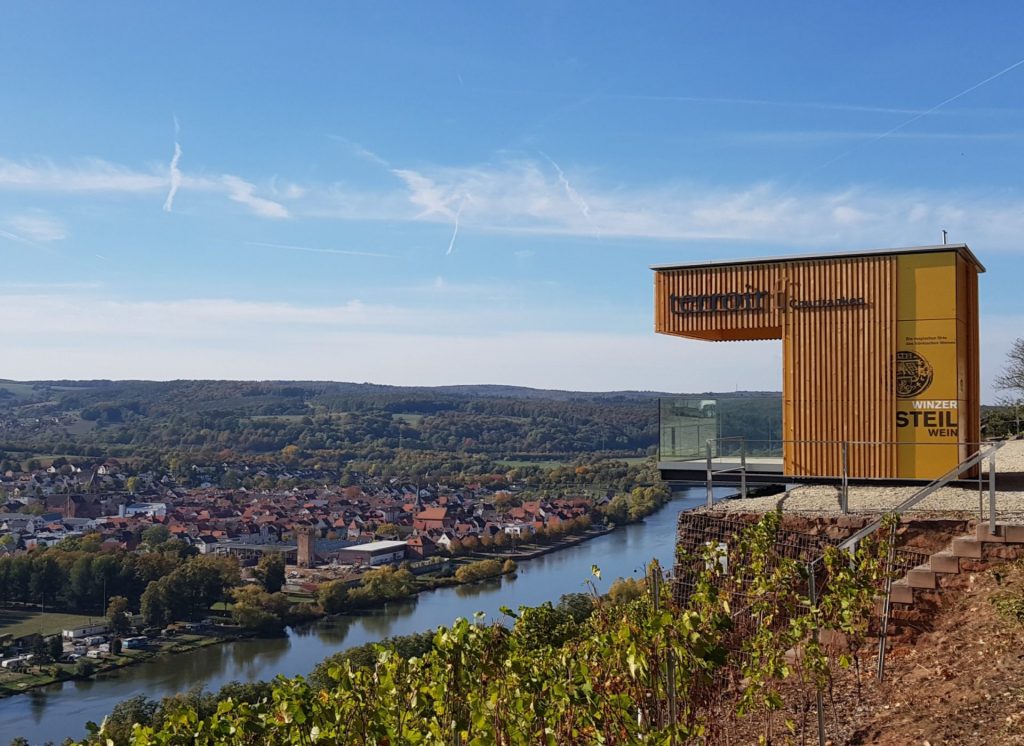
Then the group goes up a steep slope to a modern picnic platform that is on top a charming vantage point, bearing the title „Terroir f Churfranken – magical place of Franconian wine“. This terroir, one of a number in the area, was „inaugurated in October 2018“. As soon as were there, Hillerich presents his guests with a good drop.
White wines such as Müller-Thurgau, Bacchus, “Grüner Sylvaner” and a dry predicate wine: 2016 Riesling Cabinet, and a 2018 Red Traminer Auslese. Lots of bottles, not drops. This semi-dry wine convinced us with an intense rose scent and exotic flavours. The red wines, “Portugieser”, “Spätburgunder”, a genuine quality wine, and new “Rubinus”, which matured for 18 months in oak barrels, were also enjoyable. Well, the rarity is really good: 2012 Domina, Spätlese, Barrique.
As a grand finale, Reinhold Hillerich holds another rarity in store: glorious Hillpure. This liqueur wine, which is poured from matt black bottles in limited edition, looks rather ruby red. One variety tastes strong, the other seductive. Before the inner eye delicious cherries appear.
Right, the Hillpure is a port, a sweet wine and basically a classic, however not along the Main. Its roots lie in the Douro valley. But since 2011, the classic for connoisseurs feels at home on the Main in Franconia. Hillerich produces it from Regent grapes and like the privileged Portuguese lets it age in small oak barrels. Read more about this procedure from Reinhold and Thomas Hillerich under Hillpure in, lets face it, facebook.
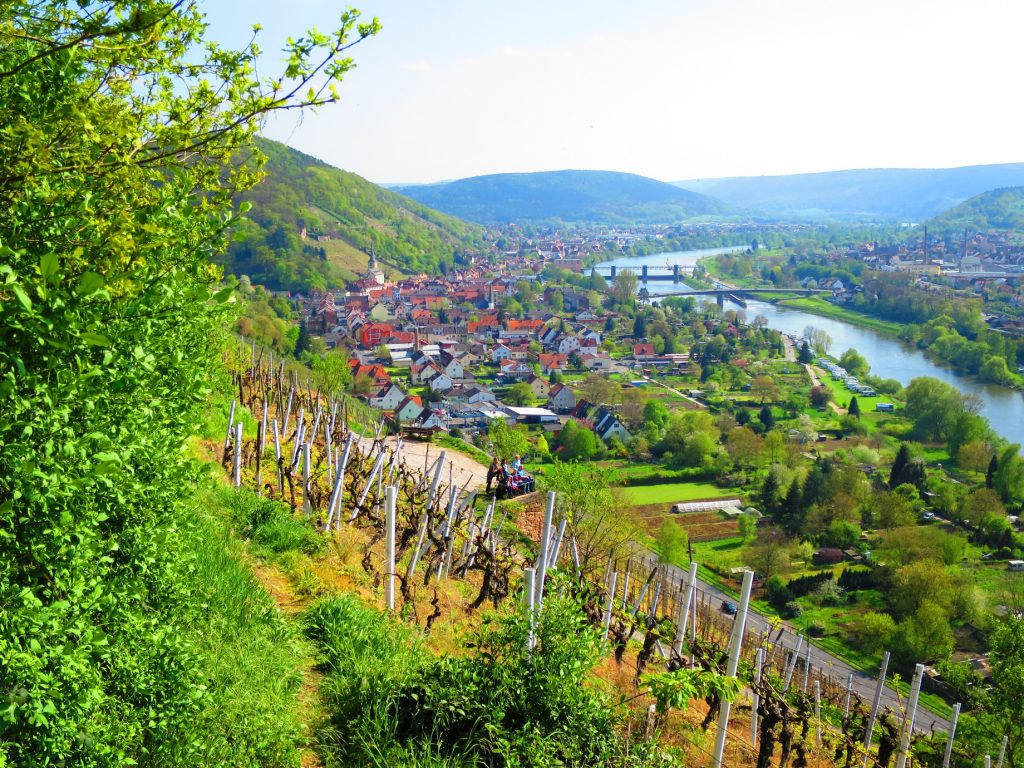
A bit tipsy, we head on towards Klingenberg, or downwards to the Main. We recommend: do not halt before being beckoned by any “Häckerwirtschaft” protruding a broom to pay a visit. Anyway, for now its cheers – and see you all back in the winery
Weingut Hillerich
Adress: Klingenberger Straße 16, 63906 Erlenbach
Contact by phone: +49 9372 6999, by mail: r.hillerich@t-online.de
Remark:
Christopher Prescott based on a text by Ole Bolle.


